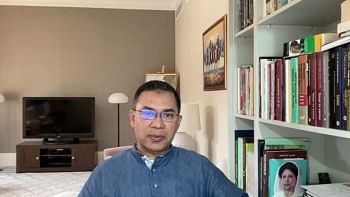An Afternoon on Syed Manzoorul Islam’s Absurd Night

An interesting event of launching the revised translation of Syed Manzoorul Islam's novel Ajgubi Raat took place on Saturday, February 15 2020 at the Campus A auditorium of ULAB. In the early afternoon, the programme was hosted by Dhaka Translation Centre. Yesmin Eti, the Editorial Associate, welcomed the audience on the auspicious occasion. Kaiser Haq, the renowned poet and the Director of DTC, Prof. Fakrul Alam, critic, translator and academic along with the author of the book, Prof. Syed Manzoor Islam took their seats on stage to discuss various aspects of the translation. Unfortunately, the translator of the book, Pushpita Alam was not present, being away as Kaiser Haq mentioned, at the "frozen wastes of Manitoba, Canada."
Ajgubi Raat, the novel in Bengali was published in 2010, by Onno Prokash. The translated version entitled Absurd Night, published by BLB under the Library of Bangladesh Series, was launched with a limited number of copies at Dhaka Literary Festival in November, 2019 as there were some errors with editing. The book was revised, republished and relaunched in this program at ULAB.
The discussants unveiled three copies of the book and the program took off with Kaiser Haq introducing the translated work of his "du diner dada," or the elder brother by two days. Syed Manzoorul Islam revealed the inside story of the tale of a severed hand that is discovered floating in a river- a hand that looks magically intact and incurs varying emotions in people who see it. Professor Islam explained that all that he writes are experiences taken from real life. The plot of this story was conceived years ago when he was staying at a remote area called Patharghata with a friend of his. The hotel manager was a fantastic story-teller and each of the hotel boys had a tale to tell regarding this hand that had caused quite a stir. In the author's mind, all these stories were thrown together with other stories he heard elsewhere—in his consciousness of a writer, it all were thrown and churned together. He asked the audience, "Can you imagine how patriarchy works at the remotest parts of Bangladesh? Things don't change so easily and yet women have to survive."
Prof. Haq, at this point, asked the chief guest of the program, the UGC Professor of the University of Dhaka, Prof. Fakrul Alam to talk about the book and the first thing that the venerable scholar said was that he did not have time to finish the book as it was delivered to him only the afternoon before. But he commended the translation and SMI' s art of weaving magic realism. He recalled incidents from yore from 1971 when bodies floated in Shitalakhya—all so real with wife- beating, brutalizing of women by their men-folks. Jealousy and violence walking hand in hand, voyeuristic impulses and man's reaction to that.
Professor Alam's only complaint against the book was the font size. He observed how the font size was a bit too small for his comfort and that the author's name too could have been slightly larger than it was.
Both Prof. Alam and Islam opined that the translation was very well-done, unlike some of the work done in recent times that had little to no connection with the original work.
Kaiser Haq drew conclusion after alluding to the problematic aspects of translation. He insisted that if the author is living, the work of translation needs to be collaborated, otherwise the meaning might be lost. Bangladesh, which has a rich literary heritage, needs more expert translators to present its literary treasures to the rest of the world.


 For all latest news, follow The Daily Star's Google News channel.
For all latest news, follow The Daily Star's Google News channel. 



Comments